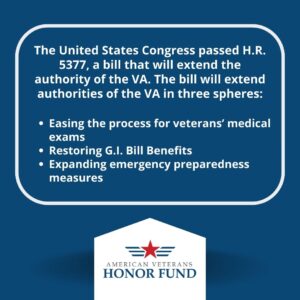On September 27th, the United States Congress passed H.R. 5377, a bill extending the authority of the V.A. This piece of legislation, originally presented on September 7th, will enable the Department of Veterans Affairs (VA) to provide essential services quickly and with less bureaucratic burdens.
For the bill’s Sponsor, Rep. Greg Murphy, this bill is just part of his larger mission to stand up for his state’s veterans: “It’s our turn to serve them.”
About Bill H.R. 5377: How Does it Affect VA Authorities?
Just like its ideals, H.R. 5377 is a rather straightforward piece of legislation. Rather than hiding behind a lofty acronym or a vague title, it instead addresses three “pain points” that have been affecting the quality of services provided by the VA.
The bill will extend authorities of the VA in three spheres:
Easing the process for veterans’ medical exams
This bill will allow V.A. physicians and nurses who perform medicals (whether for compensation cases or when applying for a pension) to practice across state lines.
This is a very important caveat for both veterans and service members, who are a highly mobile population that often relocates on short notice. Without it, the medical professionals in charge of the exam would need to be licensed in the veteran’s new state, or the service member would need to travel back to the physician’s state.

Restoring G.I. Bill Benefits
The educational loans and grants provided by the G.I. Bill constitute one of the nation’s leading engines of upward mobility. And yet, securing a flexible educational schedule is rarely an easy task. Currently, when a veteran uses their benefits at an educational institution that loses its standing with the G.I. program, or that closes down, the V.A. has the authority to restore these benefits.
H.R. 5377 extends these powers and will help more veterans afford the degrees and certifications they worked for.
Expanding emergency preparedness measures
The Veterans Administration is tasked with protecting both current service members and veterans during a public health emergency. The latest pandemic was proof enough that a biochemical threat can quickly upend lives and finances. However, these threats can also come from terrorist or enemy attacks, or even from mental health conditions.
Through this bill, V.A. Health facilities will participate in the National Disaster Medical System. This will give them more resources when acquiring supplies, tracking pharmaceuticals, or deploying quick assistance.
Who’s Behind This Bill?
The primary sponsor behind this bill is Greg Murphy, a North Carolina Republican who currently serves on the Veterans Affairs Committee. He is currently serving his third term. He is also a practicing urologist and a member of the House GOP Doctors Caucus. Dr. Murphy has previously worked in key campaigns to extend Veterans’ access to healthcare, including the availability of hyperbaric oxygen therapy for servicemembers who suffered from traumatic brain injuries.
Originally, the bill was also sponsored by Democrat Donald Davis, from North Carolina’s 1st District. He is one of North Carolina’s latest additions to the House, as he took office on January 3rd of this year. Later on, Republican James Moylan from Guam’s at-large district also added his signature.
What’s Next for Veterans in Congress?
At American Veterans Honor Fund, we firmly believe that nobody can watch over Veterans’ rights as well as other Veterans – and that society as a whole has much to gain from the discipline, integrity, and courage of our servicemembers. The next legislative battle was presented on November 9th, 2023. Once again, Congressman Greg Murphy joined forces with both sides of the alley to reintroduce the HOPE Act. This piece of legislation will help veterans who have been affected by opioid dependency, often following an injury during service.
Image Source: Canva


